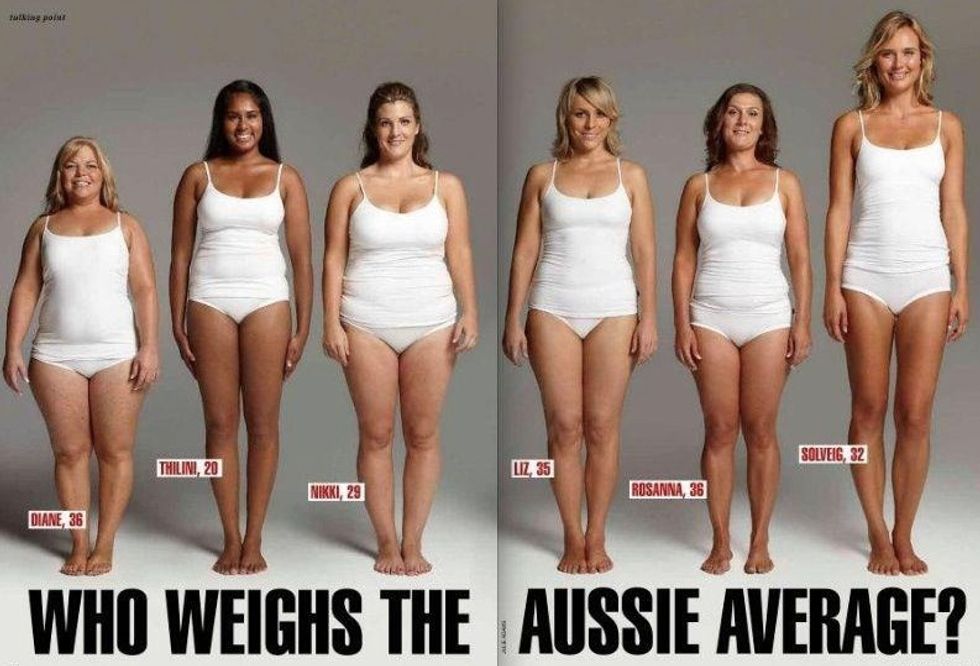Body positivity is something that all people, regardless of size, shape, color or gender absolutely need to survive. Last week, an article was written in the UNC Greensboro community that criticized the body positive movement, saying that the idea is ineffective when it 'ignores health concerns.' The article goes on to ostracize body positivity, and although I think the author had good intentions here, they did not articulate themselves at all. Here's my response to "Body Positivity Is Great And All But Not When It's Ignoring Health Concerns."
To begin, weight does not indicate health. Everyone carries their weight differently. Just because someone looks 'obese' or 'overweight' to you, doesn't mean they actually are obese or overweight. The actual definition of 'obese' is "grossly fat or overweight," but who decides if the person is grossly fat? All of the women in the photo below weigh the exact same weight, 154 lbs.
Second, if you are not a doctor, you do not have the right or the qualifications to define someone's health. There are several health conditions that can cause an individual to gain weight, and often these medical conditions don't take into consideration whether you balance your fruits and vegetables. Some of these conditions can result from thyroid issues, mental-illness-related problems, or simply side effects from hormones.
Just as many of these health conditions make it more difficult for people lose weight. This includes Polycystic ovary syndrome (PCOS), insulin resistance, or even something as simple as depression.
Next, I'd like to articulate some things. In the article written last week, the author makes a few key points which I'd like to debunk. First, they mention that the body positive movement "promotes a sedentary lifestyle."
This is so incorrect that I don't even know where to begin. Not everyone who is body positive is 'obese', or 'super-thin.' (I use these terms in quotes because I find those terms to be subjective - the opinion often lies in the eye of the beholder). Those you consider to fall under those terms aren't necessarily unhealthy.
Bigger people are not promoting anything, they're simply existing. Also, no one has ever looked at an 'obese' person and thought, "I'm going to sit around all day so I can look like that." Not sure where this claim comes from, but it honestly sounds made up.
Self-love does not equate to negativity toward exercise and dieting. Like I've mentioned before, not everyone who is body-positive is plus-size, and those that are don't necessarily hate health or exercise. I think the author was considering a very small group of people when they wrote this article, and that's simply disrespectful because they generalized a whole bunch of people.
The author of the article also posed this question to their audience, "Where is the line between body confidence and obesity?" Why does there have to be a line between the two? Couldn't the line connect both together? Since 'obese' is a subjective term, I'll begin using the word 'overweight,' or the phrase 'seemingly overweight' from now on.
Can seemingly overweight people not have body confidence? Why should self-love correlate with health at all? The two are very separate things and do not depend on one another. They can reflect one another if the individual feels that way, but they do not require one another to exist. And again, you may be severely incorrect in assuming someone is unhealthy based on the way they look to you.
What you consider 'health,' and what someone else considers 'health' is always going to be different. When people throw up the middle finger on Instagram in regards to body-shaming, they are looking to shame those similar to the author of this article. That middle finger is to shame those who think they're helping thinner people or bigger people by offering unsolicited and unqualified medical advice concerning that individual's health.
To be fair, it's never been about health. The author was correct when they mentioned the correlation between body image and society. Often people decide what is 'healthy' and 'normal' based on what they see both in the media and in society. The truth is: society will never be pleased with how you look. Clothing companies will never truly accommodate for plus size people, and if people truly cared about our health, they'd advocate for an increase in plus-size active wear, or even for the decrease of fat-shaming so that plus-size people no longer have to hide.
For some reason, people think that fat-shaming bigger people will encourage them to lose weight. It's the same with skinny-shaming, really. Here's some tea: it may encourage weight-loss, but what about when that weight-loss isn't healthy? What about when that weight-loss spirals into an eating disorder? Is that the individual's fault too?
Society and the media will never take responsibility for its faults. At the end of the day, what matters is how you feel about yourself and your body. Self-love does not and will never correlate with the amount of love you have to give, or the amount of love others have to give to you. Unconditional love for yourself will come from you loving yourself unconditionally, no matter what state you're in. You are lovable and acceptable the way you are, no matter how you are.
And no, we're not sending a radical message to anyone. Let's not pretend body-shaming is an issue that pertains only to women. We are sending a message to women, men, young boys and girls that there is a need to love yourself, rather than the need to be thinner or bigger. You just have to learn to love yourself.
Like I said, I think this author had their heart in the right place, but the execution of opinion was not the best in my opinion.
"Let's leave it to the doctors and medical professionals to criticize." Yeah, why don't we?























